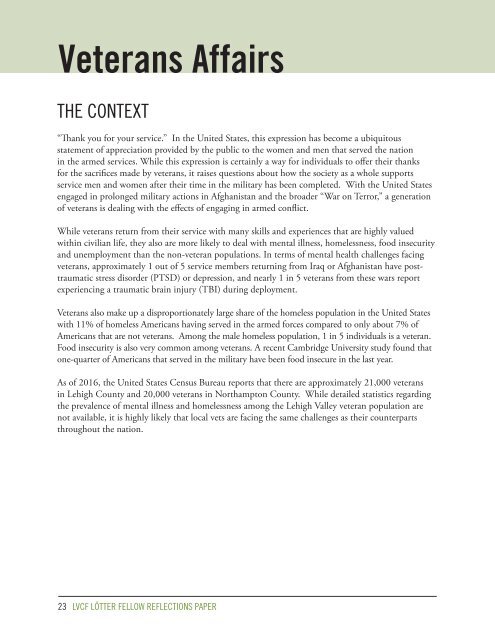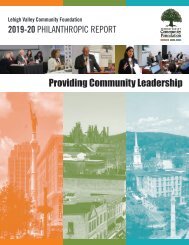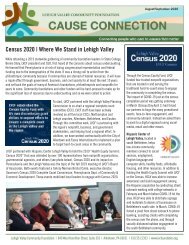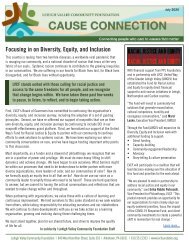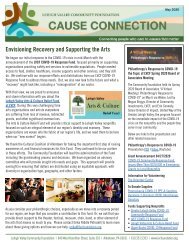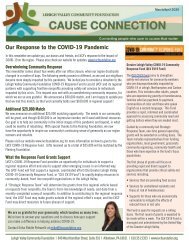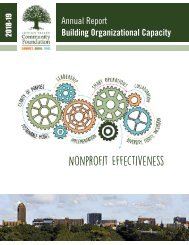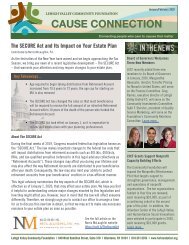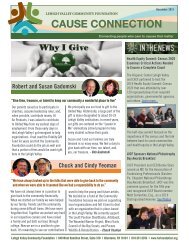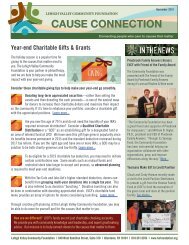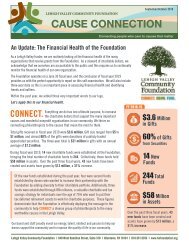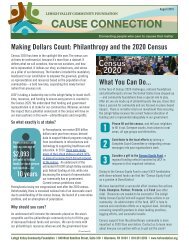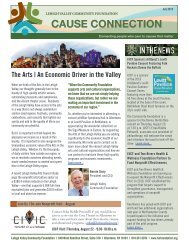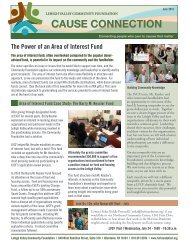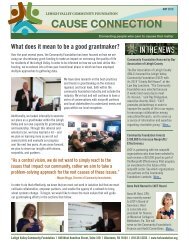LVCF Reflections Paper | 50th Anniversary Spark Grants and the Continuing Needs in the Lehigh Valley
A Reflection on the Community Foundation’s 50th Anniversary Spark Grants and the Continuing Needs in the Lehigh Valley
A Reflection on the Community Foundation’s 50th Anniversary
Spark Grants and the Continuing Needs in the Lehigh Valley
You also want an ePaper? Increase the reach of your titles
YUMPU automatically turns print PDFs into web optimized ePapers that Google loves.
Veterans Affairs<br />
THE CONTEXT<br />
“Thank you for your service.” In <strong>the</strong> United States, this expression has become a ubiquitous<br />
statement of appreciation provided by <strong>the</strong> public to <strong>the</strong> women <strong>and</strong> men that served <strong>the</strong> nation<br />
<strong>in</strong> <strong>the</strong> armed services. While this expression is certa<strong>in</strong>ly a way for <strong>in</strong>dividuals to offer <strong>the</strong>ir thanks<br />
for <strong>the</strong> sacrifices made by veterans, it raises questions about how <strong>the</strong> society as a whole supports<br />
service men <strong>and</strong> women after <strong>the</strong>ir time <strong>in</strong> <strong>the</strong> military has been completed. With <strong>the</strong> United States<br />
engaged <strong>in</strong> prolonged military actions <strong>in</strong> Afghanistan <strong>and</strong> <strong>the</strong> broader “War on Terror,” a generation<br />
of veterans is deal<strong>in</strong>g with <strong>the</strong> effects of engag<strong>in</strong>g <strong>in</strong> armed conflict.<br />
While veterans return from <strong>the</strong>ir service with many skills <strong>and</strong> experiences that are highly valued<br />
with<strong>in</strong> civilian life, <strong>the</strong>y also are more likely to deal with mental illness, homelessness, food <strong>in</strong>security<br />
<strong>and</strong> unemployment than <strong>the</strong> non-veteran populations. In terms of mental health challenges fac<strong>in</strong>g<br />
veterans, approximately 1 out of 5 service members return<strong>in</strong>g from Iraq or Afghanistan have posttraumatic<br />
stress disorder (PTSD) or depression, <strong>and</strong> nearly 1 <strong>in</strong> 5 veterans from <strong>the</strong>se wars report<br />
experienc<strong>in</strong>g a traumatic bra<strong>in</strong> <strong>in</strong>jury (TBI) dur<strong>in</strong>g deployment.<br />
Veterans also make up a disproportionately large share of <strong>the</strong> homeless population <strong>in</strong> <strong>the</strong> United States<br />
with 11% of homeless Americans hav<strong>in</strong>g served <strong>in</strong> <strong>the</strong> armed forces compared to only about 7% of<br />
Americans that are not veterans. Among <strong>the</strong> male homeless population, 1 <strong>in</strong> 5 <strong>in</strong>dividuals is a veteran.<br />
Food <strong>in</strong>security is also very common among veterans. A recent Cambridge University study found that<br />
one-quarter of Americans that served <strong>in</strong> <strong>the</strong> military have been food <strong>in</strong>secure <strong>in</strong> <strong>the</strong> last year.<br />
As of 2016, <strong>the</strong> United States Census Bureau reports that <strong>the</strong>re are approximately 21,000 veterans<br />
<strong>in</strong> <strong>Lehigh</strong> County <strong>and</strong> 20,000 veterans <strong>in</strong> Northampton County. While detailed statistics regard<strong>in</strong>g<br />
<strong>the</strong> prevalence of mental illness <strong>and</strong> homelessness among <strong>the</strong> <strong>Lehigh</strong> <strong>Valley</strong> veteran population are<br />
not available, it is highly likely that local vets are fac<strong>in</strong>g <strong>the</strong> same challenges as <strong>the</strong>ir counterparts<br />
throughout <strong>the</strong> nation.<br />
SPARK GRANTS FOR VETERANS AFFAIRS<br />
With veterans <strong>in</strong> <strong>the</strong> <strong>Lehigh</strong> <strong>Valley</strong> fac<strong>in</strong>g an array of challenges, <strong>the</strong> <strong>Spark</strong> grants <strong>in</strong> this issue area<br />
were targeted to a variety of programs serv<strong>in</strong>g <strong>the</strong> population. One central focus of <strong>the</strong> <strong>Spark</strong> grants<br />
was support of primary needs of food <strong>and</strong> shelter for veterans. As noted earlier, veterans are more<br />
likely than <strong>the</strong>ir non-veteran counterparts to be homeless or have food <strong>in</strong>securities.<br />
In response, one of <strong>the</strong> largest <strong>Spark</strong> grants was to <strong>the</strong><br />
Community Action Committee of <strong>the</strong> <strong>Lehigh</strong> <strong>Valley</strong><br />
(CACLV), through <strong>the</strong> Second Harvest Food Bank of <strong>the</strong><br />
<strong>Lehigh</strong> <strong>Valley</strong> <strong>and</strong> Eastern Pennsylvania, to assist <strong>in</strong> <strong>the</strong><br />
establishment of <strong>the</strong> Military Share: Food Access for Veterans<br />
program. This new <strong>in</strong>itiative addresses <strong>the</strong> food security needs of veterans as part of a broader effort,<br />
work<strong>in</strong>g <strong>in</strong> partnerships with three local veterans organizations, to provide veterans with a monthly<br />
box of food that is packaged <strong>and</strong> delivered by fellow veterans.<br />
The <strong>Spark</strong> grant to <strong>the</strong> <strong>Lehigh</strong> <strong>Valley</strong> Military Affairs Council (LVMAC) for<br />
its Veterans Homelessness Programs was designed to support LVMAC’s efforts<br />
to provide f<strong>in</strong>ancial assistance to homeless veterans for transitional hous<strong>in</strong>g.<br />
This program also provides broader outreach services for <strong>the</strong> challeng<strong>in</strong>g goal of<br />
identify<strong>in</strong>g homeless veterans <strong>and</strong> helps coord<strong>in</strong>ate <strong>the</strong> various services available<br />
to vets through local <strong>and</strong> government agencies.<br />
While direct support for hous<strong>in</strong>g <strong>and</strong> food needs was a key focus<br />
of <strong>the</strong> <strong>Spark</strong> grants directed towards veterans programs, resources<br />
were also targeted to help veterans f<strong>in</strong>d <strong>and</strong> receive o<strong>the</strong>r important<br />
services <strong>in</strong> areas such as healthcare. To this end, <strong>the</strong> <strong>Lehigh</strong> <strong>Valley</strong><br />
Health Network (LVHN) was awarded a grant for its Military <strong>and</strong><br />
Veteran Resource/Information Center that provides vets with services that help secure medical care<br />
eligibility <strong>and</strong> enrollment. As an LVHN representative reported to us, “The aim is to alleviate <strong>the</strong><br />
complexity of <strong>the</strong> referral process with<strong>in</strong> our healthcare system to <strong>the</strong> greatest extent possible <strong>and</strong><br />
help veterans navigate <strong>the</strong> VA.”<br />
Victory House of <strong>Lehigh</strong> <strong>Valley</strong> was awarded a <strong>Spark</strong> grant for <strong>the</strong>ir<br />
Veteran Aftercare Services Program that provides medical <strong>and</strong> case<br />
management services, <strong>in</strong>clud<strong>in</strong>g mental health <strong>and</strong> substance abuse<br />
counsel<strong>in</strong>g, to homeless veterans who have successfully discharged to<br />
self-sufficiency.<br />
23 <strong>LVCF</strong> LÖTTER FELLOW REFLECTIONS PAPER <strong>LVCF</strong> LÖTTER FELLOW REFLECTIONS PAPER 24


